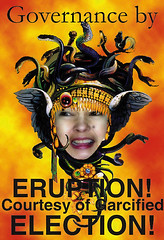Detour of our Democracy is Definitely in the Air
My attention was called by this posting in one of the yahoogroups:
But if this were a flat-off fallacy, in fact an impossibility under our present Constitution, why the scenario?
Any student of Political Science 101 knows that nothing can be enabled out of the Congress of the Philippines without the bilateral action of both its lower house, the House of Representatives and its upper house, the Philippine Senate.
And any railroading will easily be overturned by the Supreme Court. This has happened once before in the Arroyo administration, it will just repeat itself. This is crystal clear from our basic law of the land.
There are three ways to initiate amendments to the Constitution. These are found in Article XVII: " Section 1. Any amendment to, or revision of, this Constitution may be proposed by: (1) The Congress, upon a vote of three-fourths of all its Members; or (2) A constitutional convention. Section 2. Amendments to this Constitution may likewise be directly proposed by the people through initiative upon a petition of at least twelve per centum of the total number of registered voters, of which every legislative district must be represented by at least three per centum of the registered voters therein. No amendment under this section shall be authorized within five years following the ratification of this Constitution nor oftener than once every five years thereafter. The Congress shall provide for the implementation of the exercise of this right."
Activating any of the three initiatives need the enabling action of the Congress. This is what legislation is all about. Section 1 Article 6 says "The legislative power shall be vested in the Congress of the Philippines which shall consist of a Senate and a House of Representatives, except to the extent reserved to the people by the provision on initiative and referendum." (The exception explained elsewhere in Section 32 has really nothing to do with the present issue.)
Either the lower or the upper house can file a bill. After passing one house, a similar bill is filed in the other house. In case there are differences, a conference committee is called. And the conference report is submitted back to the both Houses for separate confirmation. Then the conference version, as ratified, is submitted to the President for approval or veto subject to Section 27 of the Constitution pertaining vetoes and overrides.
In the case of the present initiative for the calling of the Constituent Assembly, it has only been passed by the lower house. It will now go to the Senate for equivalent enactment.
I do not think a mere resolution can be sufficient in form.
Besides, he House resolution has also been rushed in violation of the Constitution that provides in Section 26: (2) No bill passed by either House shall become a law unless it has passed three readings on separate days, and printed copies thereof in its final form have been distributed to its Members three days before its passage, except when the President certifies to the necessity of its immediate enactment to meet a public calamity or emergency.
There were no three readings on separate days. Executive Secretary Eduardo Ermita denies complicity of Mrs. Arroyo, and besides there is no public calamity or emergency that can justify the exception.
Thus it is impossible to have a Senate-less Constituent Assembly. So back to the question, why the scenario?
The obvious answer to this question is first, money. Everytime Malacanang wants something radical coming out of the House of Representatives, large brown envelops bearing hundreds of thousand to millions of moolahs raised through the fertilizer scam and similar graft, show up in the corridors of the Batasang Pambansa. All of a sudden, regardless of the month, jingle bells ring its halls, and silent night symbolizing omerta in the country’s largest Mafia organization is hummed within its offices.
The second answer is strategic. Hooplas of this nature sweep the opposition off its feet. Civil society becomes busy with protests, activists fan grandstanding, and grandstanding heightens crab mentality as demagogues and politicians outdo each other playing to the media. It melts society to factions and the resident evil in Malacanang rules the chessboards of power – as classic divide-and-rule motions lower the 2010 election in priority and visibility.
But the third answer is insidious. The Constitutional crisis charter change through constituent assembly could setup the presidential option to call for martial law. Gloria Arroyo, and especially her husband-lawyer Mike, know they cannot amend the Constitution using due process, so they can razzle-dazzle the political air, feign dangerous zarzuelas like those former president Marcos and defense secretary Enrile staged in 1972 and exercise her powers to call for martial law citing political instability and danger to national security.
Some may say however that martial law is no longer open-ended under the present Constitution and must be defined by Congress after 60 days; democratic processes are not extinguished and continues to remain in force. Sure that is what it says on paper.
But even now the lower house is already pliant, and I doubt it very much if the stubborn Senate will prevail when the rules of the game are changed and the security of their lives and their families faces duress before the barrel of the guns of the military that is also clearly in the pockets of Malacanang.
Ask Melissa Roxas, the FilAm who was recently abducted and tortured by the Arroyo gestapo, what these animals are capable of.
Whichever way, under civilian or martial rule, the rape of our Motherland is once again in in the air. Extreme danger is foreboding. And once again, just as against the Spaniards, the Americans and the Japanese in our history, our country is in need of real heroes who will put their own lives on the line to defend our freedom and democracy, this time against tyrants of our same brown skin.
Not yet time to dig our foxholes, but for now, let us fervently pray for the Philippines.
With a Senate-less Constituent Assembly convened and directly controlled by Lakas and Kampi members, it is very easy for the said Assembly to extend the term of the President or simply delete the provision which prohibits the president from running for reelection.Today are dark times when the ruling party is preconditioning the public mind that a constitutional assembly could be implemented through the unilateral action of our House of Representatives. Let us not contribute to this deception.
But if this were a flat-off fallacy, in fact an impossibility under our present Constitution, why the scenario?
Any student of Political Science 101 knows that nothing can be enabled out of the Congress of the Philippines without the bilateral action of both its lower house, the House of Representatives and its upper house, the Philippine Senate.
And any railroading will easily be overturned by the Supreme Court. This has happened once before in the Arroyo administration, it will just repeat itself. This is crystal clear from our basic law of the land.
There are three ways to initiate amendments to the Constitution. These are found in Article XVII: " Section 1. Any amendment to, or revision of, this Constitution may be proposed by: (1) The Congress, upon a vote of three-fourths of all its Members; or (2) A constitutional convention. Section 2. Amendments to this Constitution may likewise be directly proposed by the people through initiative upon a petition of at least twelve per centum of the total number of registered voters, of which every legislative district must be represented by at least three per centum of the registered voters therein. No amendment under this section shall be authorized within five years following the ratification of this Constitution nor oftener than once every five years thereafter. The Congress shall provide for the implementation of the exercise of this right."
Activating any of the three initiatives need the enabling action of the Congress. This is what legislation is all about. Section 1 Article 6 says "The legislative power shall be vested in the Congress of the Philippines which shall consist of a Senate and a House of Representatives, except to the extent reserved to the people by the provision on initiative and referendum." (The exception explained elsewhere in Section 32 has really nothing to do with the present issue.)
Either the lower or the upper house can file a bill. After passing one house, a similar bill is filed in the other house. In case there are differences, a conference committee is called. And the conference report is submitted back to the both Houses for separate confirmation. Then the conference version, as ratified, is submitted to the President for approval or veto subject to Section 27 of the Constitution pertaining vetoes and overrides.
In the case of the present initiative for the calling of the Constituent Assembly, it has only been passed by the lower house. It will now go to the Senate for equivalent enactment.
I do not think a mere resolution can be sufficient in form.
Besides, he House resolution has also been rushed in violation of the Constitution that provides in Section 26: (2) No bill passed by either House shall become a law unless it has passed three readings on separate days, and printed copies thereof in its final form have been distributed to its Members three days before its passage, except when the President certifies to the necessity of its immediate enactment to meet a public calamity or emergency.
There were no three readings on separate days. Executive Secretary Eduardo Ermita denies complicity of Mrs. Arroyo, and besides there is no public calamity or emergency that can justify the exception.
Thus it is impossible to have a Senate-less Constituent Assembly. So back to the question, why the scenario?
The obvious answer to this question is first, money. Everytime Malacanang wants something radical coming out of the House of Representatives, large brown envelops bearing hundreds of thousand to millions of moolahs raised through the fertilizer scam and similar graft, show up in the corridors of the Batasang Pambansa. All of a sudden, regardless of the month, jingle bells ring its halls, and silent night symbolizing omerta in the country’s largest Mafia organization is hummed within its offices.
The second answer is strategic. Hooplas of this nature sweep the opposition off its feet. Civil society becomes busy with protests, activists fan grandstanding, and grandstanding heightens crab mentality as demagogues and politicians outdo each other playing to the media. It melts society to factions and the resident evil in Malacanang rules the chessboards of power – as classic divide-and-rule motions lower the 2010 election in priority and visibility.
But the third answer is insidious. The Constitutional crisis charter change through constituent assembly could setup the presidential option to call for martial law. Gloria Arroyo, and especially her husband-lawyer Mike, know they cannot amend the Constitution using due process, so they can razzle-dazzle the political air, feign dangerous zarzuelas like those former president Marcos and defense secretary Enrile staged in 1972 and exercise her powers to call for martial law citing political instability and danger to national security.
Some may say however that martial law is no longer open-ended under the present Constitution and must be defined by Congress after 60 days; democratic processes are not extinguished and continues to remain in force. Sure that is what it says on paper.
But even now the lower house is already pliant, and I doubt it very much if the stubborn Senate will prevail when the rules of the game are changed and the security of their lives and their families faces duress before the barrel of the guns of the military that is also clearly in the pockets of Malacanang.
Ask Melissa Roxas, the FilAm who was recently abducted and tortured by the Arroyo gestapo, what these animals are capable of.
Whichever way, under civilian or martial rule, the rape of our Motherland is once again in in the air. Extreme danger is foreboding. And once again, just as against the Spaniards, the Americans and the Japanese in our history, our country is in need of real heroes who will put their own lives on the line to defend our freedom and democracy, this time against tyrants of our same brown skin.
Not yet time to dig our foxholes, but for now, let us fervently pray for the Philippines.
*******************************************************************
 Ado Paglinawan is a former press officer of the Philippine Embassy in Washington DC who occasionally contributes to the Philippines Daily Inquirer. He writes for various email groups and blogs under the pseudonym "mymaestro888". Ado has best served overseas Filipinos as a resource person providing inside information and backgrounders about the celebrated fertilizer scam that rocked the Philippine Agriculture Department and the Presidency since 2004.
Ado Paglinawan is a former press officer of the Philippine Embassy in Washington DC who occasionally contributes to the Philippines Daily Inquirer. He writes for various email groups and blogs under the pseudonym "mymaestro888". Ado has best served overseas Filipinos as a resource person providing inside information and backgrounders about the celebrated fertilizer scam that rocked the Philippine Agriculture Department and the Presidency since 2004.
POGB will not sell, exchange, use or allow any 3rd party access to your email for
any other purposes without exception, email exclusively for article updates only.
Stop Cha Cha Now!
























1 Speak Out:
Kung Hindi Tayo, Sino? Kung Hindi Ngayon, Kailan?
Post a Comment